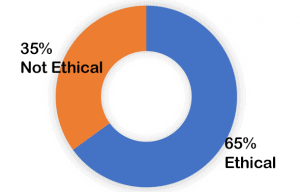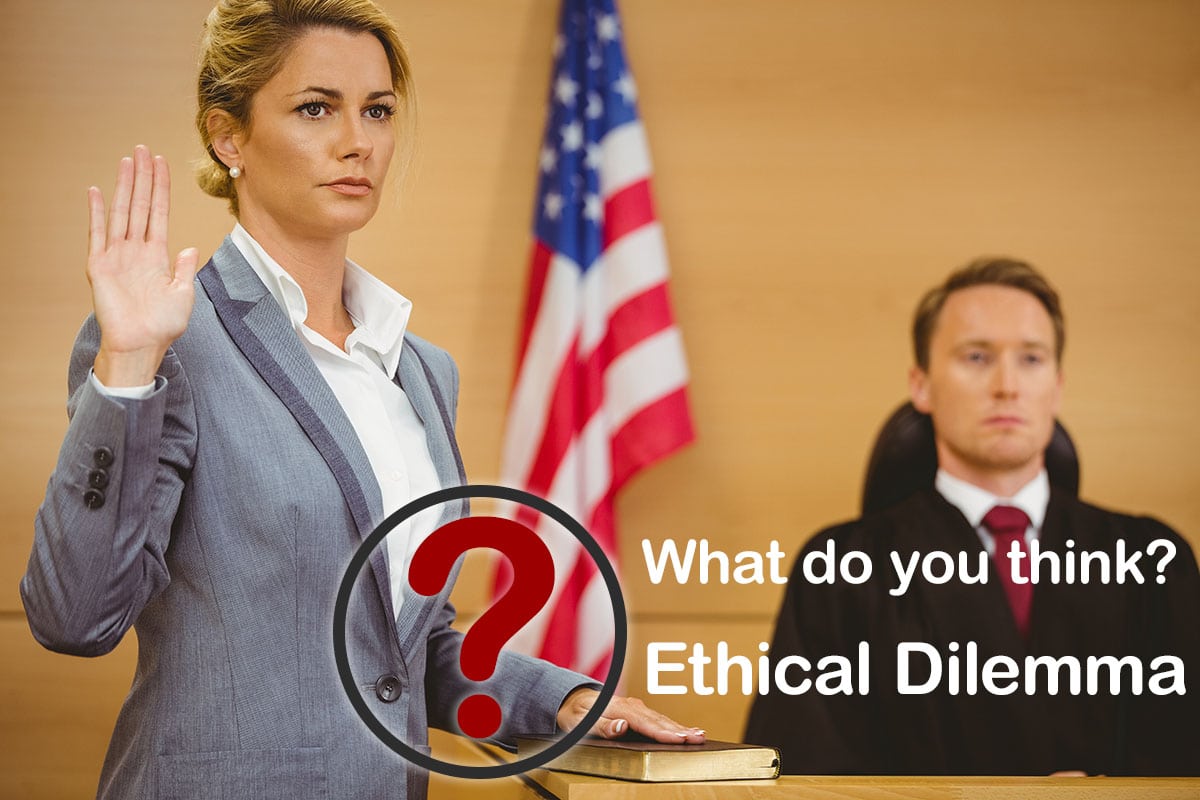This is the March 2020 edition of our monthly series of Ethics case studies titled What Do You Think? This series is comprised of case studies from NSPE archives, involving both real and hypothetical matters submitted by engineers, public officials and members of the public.
Your peers and the NSPE Board of Ethical Review have reviewed the facts of the case as shown below. And, here are the results.
Your opinion has been registered for the March 2020 edition of our monthly series of Ethics case studies titled What Do You Think?
Your vote is recorded as:

Want to know how your peers voted? We’ll send you an email with the poll results on March 24.
Your opinion has been registered for the March 2020 edition of our monthly series of Ethics case studies titled What Do You Think?
Your vote is recorded as:

Want to know how your peers voted? We’ll send you an email with the poll results on March 24.
A Review of the Facts
Sally, a professional engineer, is retained by Sam, an attorney, to serve as an expert witness for a case in litigation. As part of the services to be performed, Sam requests that Sally provide “additional assistance” in the drafting of cross-examination questions to be used with other witnesses, analyze arguments of the opposing counsel, assist Sam in case strategy for trial, evaluate the credibility of lay witnesses and critique Sam’s opening and closing arguments. Sally has no legal training, but has 10 years of experience in forensic engineering including serving as an expert witness for both the plaintiff and defense.
Would it be ethical for Sally to provide all of the services requested by Attorney in the case being litigated?
Here is the result of our survey of your peers:

Applicable NSPE Code References:
Code II.2.a: Engineers shall undertake assignments only when qualified by education or experience in the specific technical fields involved.
Code II.3.a: Engineers shall be objective and truthful in professional reports, statements, or testimony. They shall include all relevant and pertinent information in such reports, statements, or testimony, which should bear the date indicating when it was current.
Discussion
A basic principle that must be adhered to in the practice of engineering is the ethical obligation of the engineer to practice only in his or her area of competence. While a determination of what constitutes “competence” is not always easily defined, certain basic facts are inherent to any consideration of this issue. Among these factors are the education and experience of the individual, the field in which they are examined, continuing professional development, both formal and informal, and other related factors. No one of these factors is dispositive in determining whether an individual possesses adequate professional competence to perform certain services or functions.
Rather, it is a combination of these factors that must generally be examined to determine whether an individual possesses the minimum technical competence to offer or agree to perform certain services for a client.
The Board has addressed the issue of performing professional services only within the engineer’s competence on numerous occasions. In BER Case 68-11, the Board considered a case involving the review of an architect’s plans by an engineer in order to “suggest improvements, gain knowledge and assure their compliance with the specified requirements.” The Board decided that the engineer was ethically permitted to carry out the review for those aspects of the work that were within his competence. In BER Case 86-2, the Board reviewed a case involving the signing and sealing of plans not prepared by the engineer. The Board, based upon earlier Board opinions as well as Code II.2.a., determined that it was unethical for the engineer to seal plans that have not been prepared by him, or which he has not checked and reviewed in detail.
In BER Case 87-l, a case involving an application of Code II.2.a. in a different context, the Board considered a case involving a government engineer’s acceptance of a new assignment even though he lacked the technical expertise to perform the required duties. The Board found the engineer’s acceptance of the assignment consistent with the Code. In distinguishing the case from earlier cases, the Board noted that the other cases involved higher level assignments, including the supervision of individuals and operations for an employer or client, while staff engineer within a government agency who would be reporting to an experienced supervisor.
Turning to the facts of the present case, we believe that Sally probably possesses adequate competence to perform the services and activities requested by Sam. Many if not most of the services requested by Sam are of an advisory or consulting nature and are being rendered to Sam to assist him in serving the interests of his client. We are not uncomfortable with Sally performing these services and at the same time maintaining her relative objectivity and impartiality consistent with Code II.3.a. of the Code of Ethics.
We recognize the realities of the role of the retained expert witness during judicial proceedings and the fact that experts are generally retained to provide expert testimony in support of the party who retained them. We are not troubled by Sally’s service as an expert witness and at the same time providing additional assistance to Sam (e.g., in the drafting of cross-examination questions to be used with other witnesses, analyzing arguments of the opposing counsel, assisting Sam in case strategy for trial, evaluating the credibility of lay witnesses and critiquing Sam’s opening and closing arguments). We believe this additional level and type of service does not suggest a kind of involvement that would be prohibited by Code II.3.a. of the Code of Ethics.
The Ethical Review Board’s Conclusion

It would be ethical for Sally to provide the “additional services” requested by Sam in the case being litigated.
BOARD OF ETHICAL REVIEW
Donald L. Hiatte, P.E. William W. Middleton, P.E. Robert L. Nichols, P.E. William E. Norris, P.E. William F. Rauch, Jr., P.E. Jimmy H. Smith, P.E. William A. Cox, Jr., P.E., Chairman
*Note-In regard to the question of application of the Code to corporations vis-a-vis real persons, business form or type should not negate nor influence conformance of individuals to the Code. The Code deals with professional services, which services must be performed by real persons. Real persons in turn establish and implement policies within business structures. The Code is clearly written to apply to the Engineer and it is incumbent on a member of NSPE to endeavor to live up to its provisions. This applies to all pertinent sections of the Code. This opinion is based on data submitted to the Board of Ethical Review and does not necessarily represent all of the pertinent facts when applied to a specific case. This opinion is for educational purposes only and should not be construed as expressing any opinion on the ethics of specific individuals. This opinion may be reprinted without further permission, provided that this statement is included before or after the text of the case.








Been there, done that, except for the opening and closing arguments. Have written my own expert designations and certifications for defense counsel. Never a problem as long as you stick to the truth and properly represent the science behind your opinions.
There is a line that can easily be crossed in this type of case. If the engineer is required to testify as an expert witness after helping the attorney prepare the case, the opposing council must be made aware of the engineer’s contributions.
An expert witness should be neutral in giving testimony. If the engineer helps prepare the case, there is an appearance of partisanship even though the intent may not be there. An appearance of conflict is still a conflict unless all parties are aware of the actual relationship between the attorney preparing the case and the engineer called as an expert.
Attorneys do not generally have an understanding of the various technical issues in many areas that engineers cover. Often the attorneys need help in understanding and addressing even some very simple basic concepts of mathematics, physics, materials etc. Acting in an advisory role, even to the extent of preparing questions and interpreting testimony, is not outside the purview and skill of an experienced engineer, particularly one that often participates in court actions. It is still necessary to maintain one’s integrity and objectivity in whatever part is played in the process.
In my opinion, by performing the added duties for Sam in helping the preparation and strengthening of his defense of his client, Sally has opened herself up to the appearance of partiality towards Sam’s client which would preclude her impartiality required for expert witness testimony. In essence she has taken sides in the case.
I agree with A.P.’s comment above and that is the opinion I would offer. Sally should decline the extra services and Sam should find another P.E. for these services and let Sally be Sally the expert witness.
I would like to know how many of the ethical review experts have faced this issue. I would not do this myself but I am not someone seeking work in this area.
I also agree with A.P.’s comment about a perception of partiality in Sally’s role as an expert witness.
When I am asked to provide expert witness services as a professional engineer, I first review the case just enough to determine where I will likely stand with my opinion (I ask for a relatively small retainer to reach that preliminary juncture). I express this opinion/conclusion to the attorney. If he does not like it then he can find another expert elsewhere. If it aligns with his argument then he typically fully retains my services. Hence, I have already expressed my general opinion(s) to the attorney and we are in general agreement. In that case, assisting him with technical components of his queries, etc., is not displaying impartiality. I have come to a conclusion and the elements that led me to it are often intertwined with the witnesses that the attorney will depose, examine, or cross-examine. In that case, I neither see a conflict nor impartiality. However, should I be deceptive about my honest professional opinion and conclusion regarding the case and simply do whatever I need to support the attorney’s case then I am being unethical.
As long as we as experts adhere to our ethical duty to be objective and truthful there is no conflict. Attorneys want to know the strengths and weaknesses of their case. Most attorneys expect experts to help in case preparation. We, as technical experts, are best suited to provide this assistance. If an expert is biased (hired gun) that will be apparent in their expert report. It’s important to alert your attorney if bias is present so the attorney can explore it during cross and make the jury aware of the bias. This goes to the credibility of the opposing expert.